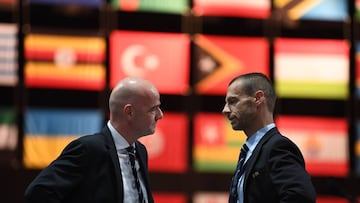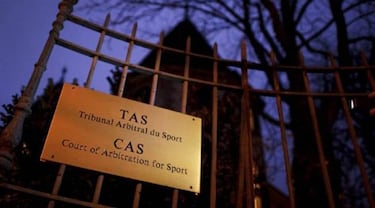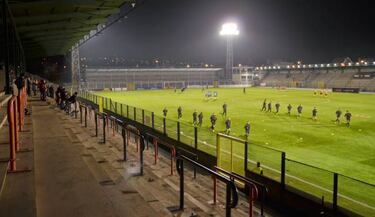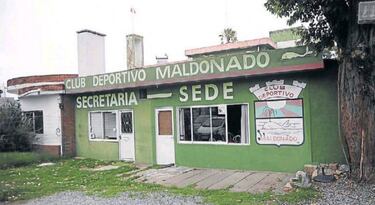The future of football business in the hands of a Belgian court
UEFA and FIFA face another potential Bosman case with a Belgian court set to deliver a verdict in January on the legality of 'financial fair play' and third-party ownership.

The future of the football business faces a decisive date in Belgium on 18 January, when the Brussels Court of Appeal delivers its verdict on a case that could shake the foundations of FIFA, world football's governing body, and UEFA, its European counterpart. At stake is the legality of the ban on third-party ownership (TPO) and of 'financial fair play' (FFP) regulations, as well as the legitimacy of the 'forced arbitration' of the Court of Arbitration for Sport (CAS), and the above authorities' ability to impose disciplinary sanctions.

Represented by the lawyers Jean-Louis Dupont and Martin Hissel - who have previously worked on the Bosman and Meca-Medina cases, and the G-14's legal battle against FIFA and UEFA - the Belgian club RFC Seraing and the investment fund Doyen Sports took FIFA to court over its ban on "the ownership of football players' economic rights by third-party sources", which was approved in December 2014. The ruling came as a result of the insistence shown on the issue by UEFA, who three years earlier had imposed its 'financial fair play' rules.
Lawsuit filed in 2015
In their lawsuit, which was filed in spring 2015, Seraing and Doyen are calling for strict regulation of TPO rather than complete prohibition. FIFA handed sanctions to Seraing in September 2015 for breaching its TPO rules, banning the Belgians from registering new signings for the following three transfer windows - a suspension applying all the way down to five-year-old youth players - and fining the club 150,000 Swiss francs. FIFA and UEFA justify their decision to outlaw third-party ownership on a series of ethical questions, arguing that the practice undermines the dignity of the player and the freedom of the clubs themselves, and endangers the integrity of sporting competition.

However, FIFA has introduced no transparency measures or codes of ethics relating to the ownership of clubs. In some countries it is difficult to ascertain who the true proprietor of a club is, with many in the hands of organised crime, say the complainants. "A number of clubs in Central America are the property of drug cartels," they state. It is a problem that FIFA has on occasion acknowledged. "Organised crime has infiltrated several levels of football, with the precise purpose of making money. We're seeing a trend for the purchase of low-level clubs and the movement of players and the trafficking of players," said the organisation's former security chief, Chris Eaton, in February 2016.
Deportivo Maldonado
In line with the ban on TPO, there are now no third-party owned players; for example, however, a (hard-to-precisely-identify) owner of a club from a minor league could sign a young footballer before then selling the player on to a Spanish or English club the next day and keeping 50% of the athlete's economic and federative rights. This type of dealing, which is not punished by FIFA, could be considered a form of TPO, carried out under the umbrella of a club. Many investment funds have also moved to buy 'front' clubs. Uruguay's Deportivo Maldonado, the 'ghost' club owned by Stellar Group, whose chairman and founder is Gareth Bale's agent, Jonathan Barnett, is among the most notable cases. According to the plaintiffs, the TPO ban has led to trafficking.
The ongoing case in Brussels could also have far-reaching consequences for FIFA and UEFA that go beyond the question of the legality of the TPO ban, according to sources close to the lawsuit. The case could also have repercussions for the 'break-even rule' detailed by UEFA in its FFP regulations, and the even more significant issue of the legality of 'forced arbitration'. FIFA and UEFA's statutes order all legal disputes to be settled exclusively by the CAS.

Seraing are questioning the legality of obligatory arbitration of this kind, and are particularly basing their challenge on the ruling by Spain's Supreme Court in the Roberto Heras doping case, when in 2012 the country's highest judicial body annulled the cyclist's positive drugs test in the 2005 Vuelta de España, concluding that Heras did not have to take his appeal against his punishment to the CAS, and that athletes' consent to this tribunal was not 'free and voluntary'. Seraing also contends that there is room for doubt over the impartiality and independence of the CAS, given that the body is under the economic and political influence of sport's international federations. Furthermore, as it is based in Switzerland, the court does not have to apply European Union law.
Seraing also object to the disciplinary power of the international federations, particularly when they implement sanctions that are not only damaging to clubs and their directors, but also to innocent third parties such as employees or the children in the teams' academies. The Belgian club cannot register any minors in their youth systems during their ban, which affects the social fabric of the surrounding area.
Related stories
The plaintiffs have asked the Brussels Court of Appeal to raise a series of questions before the Court of Justice of the European Union (CJEU) with a view to settling this issue within the framework of the fundamental freedoms that the EU protects (free movement of goods, people, services and capital) and of EU competition law.
If the Brussels Court of Appeal passes the matter on to the CJEU, the ability of football's international federations to regulate all economic aspects of the sport, to have an independent judicial system and to implement sanctions against third parties would come into question. The survival of FIFA's model would be at stake in Luxembourg. The case could relegate the Bosman ruling to the status of mere hors d'oeuvre...
